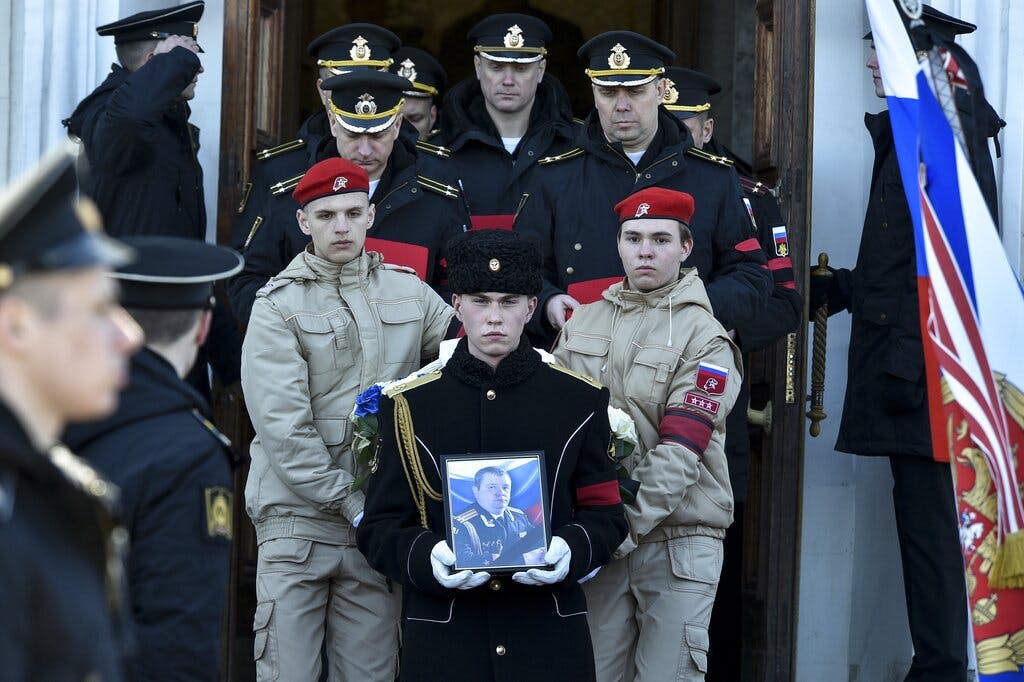Reality Checks for Russia as West Sizes Up Moscow’s Battlefield Losses
Citing a senior NATO official, one report says 40,000 Russian troops have been killed, wounded, taken prisoner, or are currently missing in Ukraine.

Four weeks into Russia’s unjustified attack on Ukraine, Moscow has received a stark reminder from NATO about the human cost of its warmongering: The Western military alliance estimated on Wednesday that 7,000 to 15,000 Russian soldiers have been killed so far in its war, the AP reported.
That may actually be a best-case scenario. Citing a senior NATO official, the Wall Street Journal reported today that a staggering 40,000 Russian troops have been killed, wounded, taken prisoner, or are currently missing in Ukraine.
By way of comparison, Russia lost about 15,000 troops in Afghanistan over a 10-year stretch.
Russia began its invasion with roughly 190,000 troops and has since has since brought in additional troops from Chechnya, Syria, and other locations, the Journal reported.
With any Kremlin hopes of an easy victory in Ukraine accompanied by swift regime change now firmly quashed, and its ground forces either impeded or picked off by hit-and-run Ukrainian units armed with Western-supplied weapons, Vladimir Putin’s troops are now as a matter of course striking targets from afar.
The most heart-wrenching example of this brutal pivot is the besieged city of Mariupol on the northern Black Sea coast; thousands of residents are still trapped even with most of the city in ruins and it’s getting worse by the day. Russian state-owned news agency RIA Novosti reported today that units from the breakaway Donetsk People’s Republic are now fighting with “militants of the national battalions” in the village of Azov, which it calls a suburb of Mariupol. There have also been reports of Russian shelling of Mariupol from ships offshore in the Sea of Azov.
Greek newspaper Kathimerini reported that President Zelensky thanked the Greek foreign minister, Nikos Dendias, for his willingness to lead a humanitarian mission to Mariupol pending permission by both Ukraine and the invading Russians.
“He is the first European official who has decided to support the work of the humanitarian corridors to Mariupol,” Mr. Zelensky said.
The mayor of Kharkiv, Ihor Terekhov, said on his Telegram account that Russian forces have destroyed 1,143 buildings in Ukraine’s second-biggest city, 998 of which are residential, since the fighting began a month ago.
Things also look increasingly bleak in Chernihiv, where the Guardian reports that about 150,00 people are without heat and local officials have imposed drinking water rations on the civilians who are essentially trapped in the northern city. The accusation that Russia has taken the city hostage, as the newspaper reports, appears to be woefully accurate. Chernihiv’s mayor, Vladyslav Atroshenko, said that Russian troops were firing on hospitals and that “now there are 40 funerals per day taking place in Chernihiv,” according to news agency Ukrinform.
As NATO prepares to bolster its forces in Eastern Europe, what Ukrainians want now are more weapons — and they are getting them. Swedish newspaper Hallands Nyheter reported that the Swedish defense minister, Peter Hultqvist, said Stockholm will provide additional anti-tank equipment to Ukraine. Sweden has already sent 5,000 anti-tank weapons to the country.
Reuters reported that the German foreign minister, Annalena Baerbock, said on Wednesday that after delays in deliveries, further supplies of Strela missiles, which had been in the inventories of the former Communist East German army, were on the way to Ukraine.
The Belarusian government shut down Ukraine’s Consulate General in the western city of Brest (not to be confused with the western French city of Brest) and ordered an unspecified number of Ukrainian diplomats to leave the Ukrainian Embassy in Minsk as Belarus continues to assist Russian armed forces in their attacks against Ukraine, Radio Free Europe reported.
A Belarusian foreign ministry spokesman said that Ukraine’s ambassador and four employees at the embassy in Minsk will be allowed to stay in the country, while the rest of the staff will be forced to leave. American and NATO officials have previously said that there was a risk that the Belarusian military could join up with Russia in its continuing assault on Ukraine.
It won’t be music to Mr. Zelensky’s ears, but the German chancellor, Olaf Scholz, has rejected an immediate embargo of Russian fossil fuels as economists slashed growth forecasts for Europe’s largest economy, the Financial Times reports.
Ahead of meetings with other EU leaders and a G7 meeting with President Biden in Brussels this week, Mr. Scholz told the Bundestag on Wednesday that immediately cutting Russian energy imports would trigger an economic crisis, the newpaper reported, and that Mr. Scholz was backed by the BDI, Germany’s main business lobby group. The group warned that cutting off Russian gas supplies to the EU would have “incalculable consequences,” and cause “production disruptions, employment losses and, in some cases, massive damage to production facilities.”

